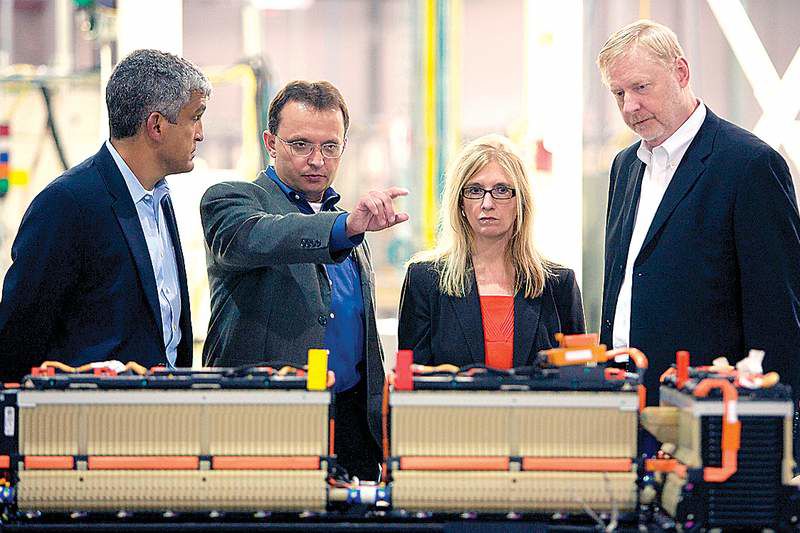GM to guarantee battery on electric car for 8 years
Published 5:00 am Thursday, July 15, 2010

- General Motors executives, from left, Micky Bly, Bill Wallace, Nancy Laubenthal and Tom Stephens announce a warranty of eight years or 100,000 miles for its Chevrolet Volt batteries in Brownstown, Mich., on Wednesday.
In an effort to lure early adopters who might hesitate at dropping more than $30,000 on a mass-market electric car, General Motors said Wednesday that it would guarantee the battery on its forthcoming Chevrolet Volt for eight years or 100,000 miles — better than the five-year or 100,000-mile warranty it typically offers for the powertrain on its conventional cars.
The warranty will cover all 161 battery components, according to Tony DiSalle, the marketing director for the Volt, as well as other electric-drive components and the battery’s liquid thermal management system, designed to heat or cool the battery while charging in a variety of weather conditions.
Battery warranties within the nascent electric vehicle market have been a matter of much speculation — not least because consumers familiar with lithium-ion technology in everything from cell phones to computer laptops long ago learned that the batteries can be finicky, lose their charge and eventually die.
“Everybody has been sensitized to batteries and battery-life issues,” said Philip G. Gott, director of automotive consulting for IHS Global Insights, a market research firm. “You don’t want to be stuck with a four-year-old car that needs $4,000 worth of work.”
GM’s move will probably set the bar for competitors like Nissan, the Japanese car giant, which plans to begin rolling out its Leaf electric vehicle this year. Nissan has not yet revealed its warranty terms but has said they will be competitive.
Tesla, a Silicon Valley-based maker of electric cars, provides a three-year or 36,000-mile warranty on its Roadster sports car.
The Volt and the Leaf are at the leading edge of a major rollout of electric vehicle technology in the United States, even though a public infrastructure for charging the cars is far from being sorted out. Both cars will include some form of home-charging system.
The Volt is expected to be available for retail sale in four markets — California; Washington, D.C.; Austin, Texas; and the New York City metropolitan area — by the end of the year, with availability in all 50 states aimed for 12 to 15 months after that.
GM said this month that it planned to produce 10,000 Volts by the end of next year, with an additional 30,000 cars planned for 2012.
The official retail price for the Volt — which has an advertised range of up to 40 miles on a single charge, plus a gasoline-assisted “range extender” feature — has not yet been announced, but estimates are in the range of $35,000 to $40,000, with federal tax credits likely to shave off several thousand dollars for many buyers.
The Nissan Leaf, a fully electric car with a marketed range of up to 100 miles per charge, will retail for just under $33,000, and the same credits could help.
The warranty announcement came a day ahead of President Barack Obama’s arrival in Holland, Mich., where he will attend groundbreaking ceremonies for a new plant that will manufacture the Volt’s battery packs.
The battery company, Compact Power, is a subsidiary of the South Korean battery maker LG Chem, and the plant is expected to employ roughly 300 people. Ford Motor Co. announced this week that it, too, would be using batteries manufactured by Compact Power in the electric version of its Ford Focus, which it plans to begin marketing next year.
The Obama administration carved out $2.4 billion in grants from last year’s economic stimulus package to help pay for research and production on advanced battery and electric vehicles. That money has gone to some four dozen projects developing batteries and electric drive-train components in more than 20 states.






